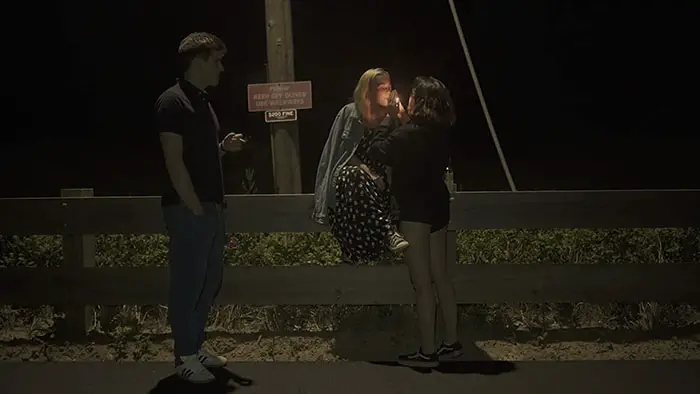
Revisiting their short film, Touch Me Not, filmmaker Joshua Cox and lead actress Molly Miles expound on its story in Summer of Mesa—a wispy, delicate, dreamlike feature that showcases the beauty and heartache of summertime romance. Summer of Mesa adds more threads to Touch’s fabric, but more importantly, it demonstrates just how much they have both matured as a director and actress, respectively.
Miles reprises her role of Lily, a young girl arriving at Cape Cod for the summer, spending those wistful, halcyon days re-reading favorite books (“Little Women”), and befriending the locals in the sleepy beach town. Lily’s grandmother takes her to her friend’s house, wherein she becomes reacquainted with her childhood friend Johnny (played by Alec Bandzes). Their awkward conversations suggest an attraction, and they playfully dance around the edges of an actual physical connection.
When Lily encounters a local named Mesa (played by Andrea Greanera, replacing Jaime Sullivan, who played the role in the short). As the temperature shifts, her lingering glances at Mesa suggest she is equally intrigued like a sparkler on a summer’s night at the beach. There are no grandstanding, no proclamations of feelings throughout Summer of Mesa, as Cox seems determined to merely let us flip through the pages of this summer photo album and recall our own carefree days of young love.

“Their awkward conversations suggest an attraction, and they playfully dance around the edges…”
Acting as a one-man production crew as the film’s writer, producer, cinematographer, location scout, casting director, editor, and director, Cox has certainly matured in the three years from his short, demonstrating a solid grasp on lighting, scene transitions, and design. Though the film was set in 1985, there is a timeless quality to the film, and it never relies too heavily on ensuring it nails the pop-culture of the decade. Storywise, Cox also learned from the shortcomings of Touch Me Not and made noticeable improvements on staging, and even allowing the dialogue to emerge with more fluidity.
It’s aided as well by its three naturalistic leads, as their rapport with one another never once seems forced. All carry with them the clumsiness that accompanies youth navigating through these complex emotional waters for the very first time. The Summer of Mesa is feather-light, void of melodramatic moments, and even with its $400 budget, it still manages to capture the wistful, cumbersome growing pains of summer love with big-budget authenticity.

"…manages to capture the wistful, cumbersome growing pains of summer love..."


